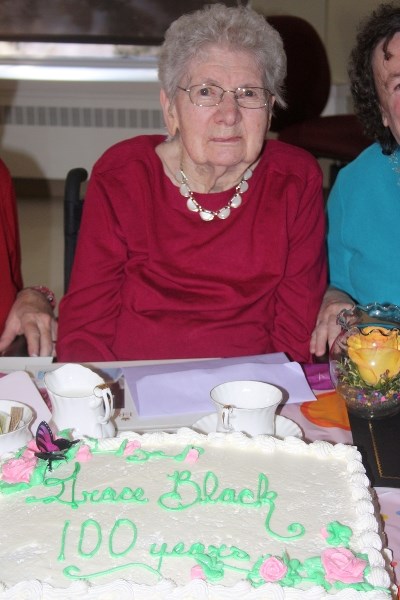She was a Brown, who was nearly a Violet, and eventually became a Black.
Colour has played a big part in Grace Black’s life. Not only with names, but also with the momentous events, some global, some deeply personal, that shaped it.
Consider the first half of her 100 years. Some might say it was almost too colourful.
She was born Grace Susan Brown in southern Ontario on the threshold of the First World War, her earliest memories infused by a child’s puzzlement at the unfolding drama.
She survived the flu pandemic of 1918 that claimed the lives of several boys in the neighbourhood and killed 50 to 100 million people worldwide.
She suffered the trauma of losing her elder sister, Ruth, who got a bad cold at 16 and succumbed to the illness, there being no vaccines or antibiotics in those days.
She also lived through the Second World War, a period of great stress in homes everywhere, as parents prayed for the safe return of their children.
It wasn’t all turbulence, however. For a life, no matter how colourful, is always experienced in multiple shades.
One of Grace’s brightest days was in June 1942 when she married Robert Herbert Black, the farmer she had met four years earlier while teaching in the rural community of Craigville, Ontario.
Many more joyful days followed.
After war ended in 1945 Grace raised three daughters – Susan, Jean and Ruth, the latter named after her sister – and in the second half of her life she became a grandmother, then a great-grandmother.
Today she proudly declares she has seven grandchildren and four great-grandchildren, with more on the way.
Last Saturday afternoon, dozens of family members gathered at the Keir Care Centre to wish Grace a happy 100th. Some came from as far away as Ontario and New York to mark the occasion, others travelled from Calgary and Whitecourt.
The grandchildren wore T-shirts emblazoned with “Happy 100th birthday, grandma.”
There were speeches, singing, a little bit of dancing and, of course, a giant birthday cake.
Great-grandchildren Jessica Fierbach, Nicholas Fierbach, Joshua Fierbech and Iain Grozelle took turns to give the birthday girl a big hug.
As is traditional, Grace received a card from the Queen, congratulating her on her milestone.
Town councillor Roy Ulmer also presented her with a plaque on behalf of the council.
Partygoers were then treated to a special “100 years of Grace” presentation, recording the highlights of her life. It was interspersed with songs like “It’s A Long Way To Tipperary,” “Come To The Fair,” “Whatever Will Be Will Be,” and “This Land Is Your Land,” with Grace’s daughter Susan Oleskiw playing the piano.
Nephew Glen Brown, from Calgary, read from Grace’s notes about her life, starting with her birth on Monday, February 24, 1913 on a farm called “Glenedra,” near Bradford, where she was raised with two sisters, Ruth and Irene, and two brothers, Clarence and Ernest, now 92 and living in Ottawa.
“Mother was going to call me Violet but her sister thought Grace was a nicer name,” she recalls. “I was the fourth generation of Susan, a family name since my great-grandparents emigrated from Ireland.”
Initially Grace wanted to be a nurse, but two bouts of pneumonia raised doubts whether she could handle 12-hour shifts, so she turned to teaching.
After marriage, Grace moved into the Black family farmhouse built in 1866, doing “all the duties of a farm wife in the 1940s and 50s.”
When their daughters left home, she and Herb retired to a house in Stroud. Herb died in 1981.
It was because of her daughter Susan that Grace’s journey led to Barrhead.
“Susan has worked in Barrhead since 1987 and when she moved back to Barrhead in 1999, I came with her,” she writes. “That is how I came to be in Barrhead, Alberta.”
So did Grace enjoy her birthday?
“I am having a wonderful birthday,” she said. “Everybody is doing something for me.”



